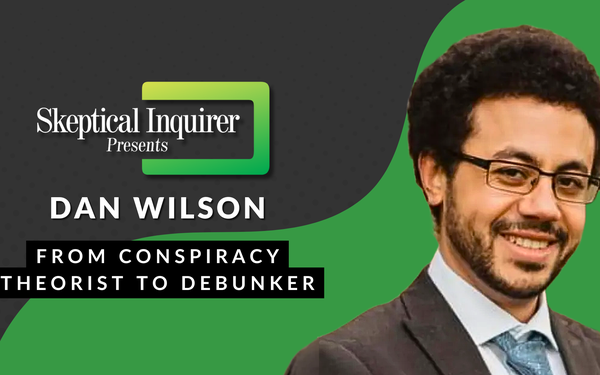
Last week, Health & Human Services Secretary
Robert F. Kennedy Jr.’s assault on vaccines and science escalated, with the cancellation of Moderna’s federal funding to develop a vaccine for bird flu, cutbacks in COVID vaccines for
children and pregnant women, and a threat to stop government scientists from publishing in so-called “corrupt” top medical journals.
Then there was the “Make America Healthy
Again” manifesto, whose backing evidence included several “studies” that turned out to be nonexistent.
Seeking to cope with it all, I tuned into a webinar featuring the man
behind the popular “Debunk the Funk with Dr. Wilson”
YouTube channel.
advertisement
advertisement
“I debunk a lot of pseudoscience and misinformation,” former conspiracy theorist-turned-biologist Dan Wilson told a session of The Center for Inquirer’s
“Skeptical Inquirer Presents” series.
Dr. Wilson launched his channel in February 2020 with a video showing that contrary to the already spreading rhetoric of anti-vaxxers,
vaccines were tested for safety. A month before the pandemic hit, COVID wasn’t even mentioned, but was soon the channel’s main topic.
Wilson himself had gradually turned
away from conspiracy theories when confronted by facts that “chipped away at my beliefs.”
“Hit people between the eyes with facts, something they can't really argue
with,” he urged, borrowing that specific phrasing from Lee McIntyre’s book, “How to Talk to a Science Denier.” “Try to give them a puzzle piece that just won't fit
into how they see things.”
Wilson recalled a recent podcast in which Joe Rogan and Aaron Rodgers asserted that a tetanus vaccine wasn’t needed because “you can wash a wound
with soap and water.” But then a stat appeared on screen stating that hundreds of thousands of people die annually worldwide from tetanus.
While the duo then blamed the CDC
for untrustworthy data, “if I was in the room I would point out that, ‘Joe, you pride yourself on being a critical thinker…but if you were critically thinking… you would
ask…are they getting those numbers from health departments of other countries?...Are all these health departments all over the world lying?’
While Rogan and Rodgers might not
change their minds, such info “can be jarring for people to see that the influencers, the podcasters, the people who are getting attention and pushing these harmful ideas don’t really know
what they’re talking about .”
Pointing out facts that counter the pseudoscience is “something we can do in our conversations with people on a daily basis….If you have
a family member who says something at dinner, maybe bring something.to the next next meal that you think will make them stop and think."
But Wilson cautioned, “if you’re going to
have these conversations, it’s important to understand where these people are coming from.”
He gave three reasons why people fall down the “rabbit hole”:
Sense of security. Conspiracy theories “make the world much simpler. So instead of, say, a scary virus killing millions of people around the world, it’s all fake and you
don’t have to worry about it.”
Illusion of knowledge. “When we feel we’re being let in on certain things that a lot of people just don’t know about, you
feel you’re part of an exclusive club. That can be very attractive to people who feel honestly overwhelmed by the slew of information we have available to us.”
Most importantly,
“being a conspiracy theorist [can give theorists] a sense of community.”
And that community has now grown much larger, Wilson acknowledged, “even identified
with a political party….We see people saying what conspiracy theorists believe on stages in politics, in high-ranking positions.”
Wilson also called out journalists for failing to
ask the same kinds of questions he feels we all should be asking.
He pointed to a recent interview with RFK Jr. where a reporter “kept harping” on the Secretary’s changing
timeline “for figuring out what causes autism.” Instead, Wilson said, the reporter could have confronted RFK Jr. with this fact: “The NIH is banning particular words from
grants, from fellowships, from papers being published by their scientists… This basic research goes towards studying things that help us understand the physical world so that we can better make
medicines….And one of the words is ‘autism.’”
“We need to be more aggressive in pointing out the hypocrisy, especially in people in power,” Wilson
declared.
“I don’t know exactly what science will look like in the U.S. a few years from now or at the end of this administration,” Wilson said. “But we have to do our
best to at least make sure the good information is out there and that people are listening to it.”